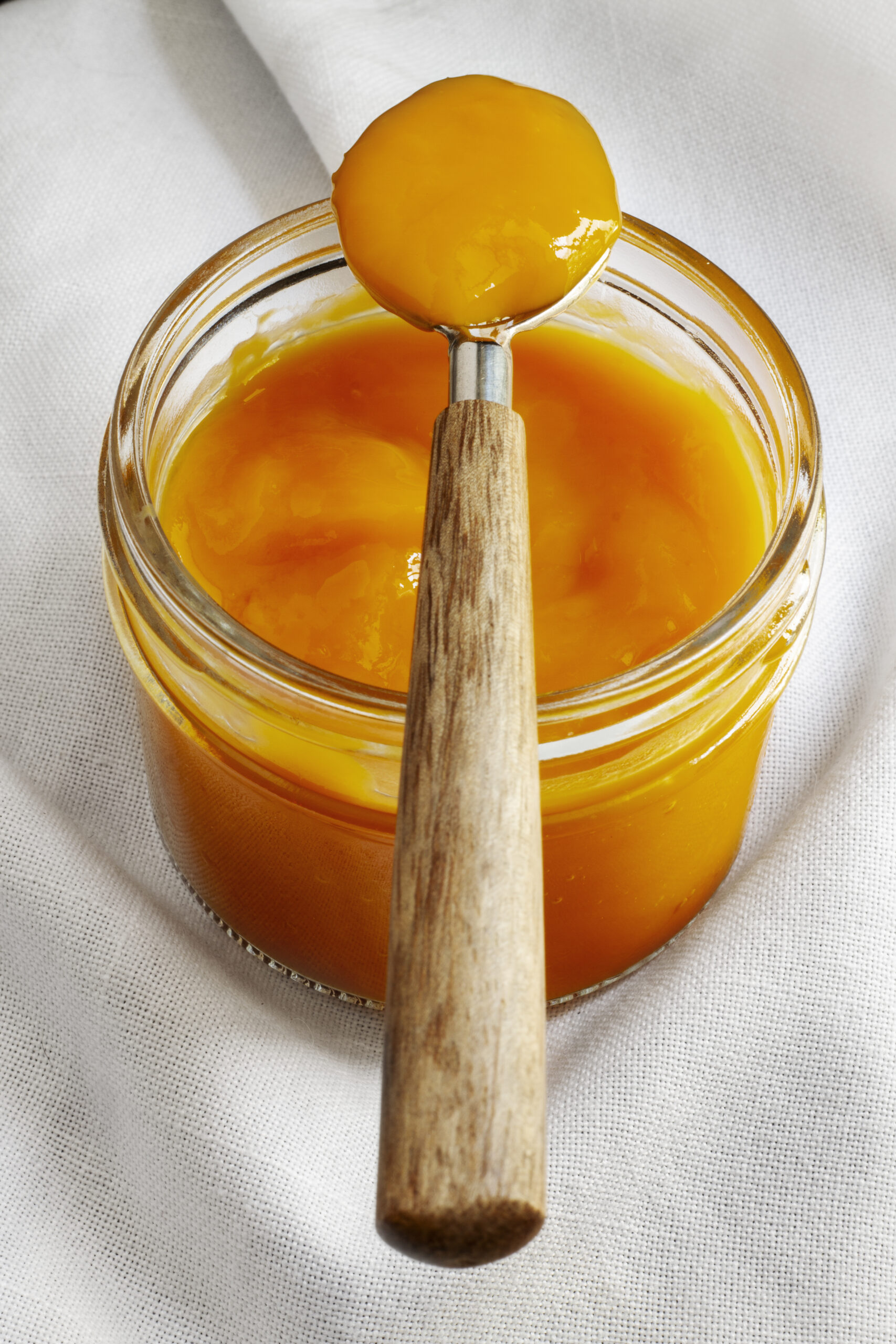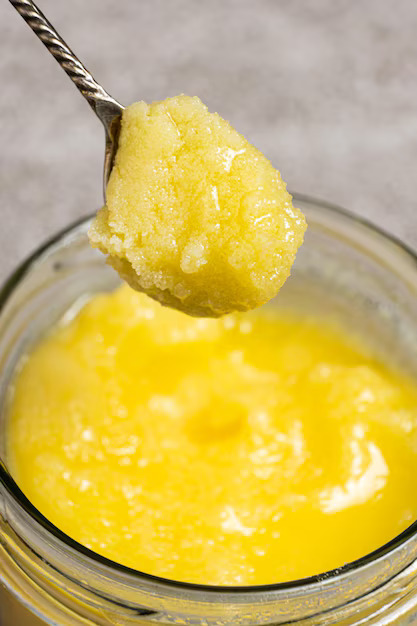7 Ghee Benefits And Their Side Effects
Ghee, also known as clarified butter, has been a staple in traditional Indian kitchens for centuries. Beyond its culinary allure, ghee is revered in Ayurveda and other ancient medical systems for its therapeutic properties.
In recent years, ghee has garnered global attention as a nutrient-rich superfood, especially among fitness enthusiasts, health-conscious individuals, and natural living advocates.
But like all good things, moderation is key. Understanding both the benefits and side effects of ghee is essential to making informed health choices.
In this comprehensive guide, we delve into the 7 key benefits of ghee and the potential side effects of overconsumption or misuse.

What is Ghee?
Ghee is a type of clarified butter made by simmering butter to remove the water content and milk solids. The remaining golden liquid is rich in healthy fats and has a high smoke point, making it ideal for cooking. Ghee is lactose-free and shelf-stable, making it a versatile and long-lasting kitchen essential.
Traditional ghee is made from cow’s milk, and in Ayurveda, it is considered a “sattvic” food, promoting purity, clarity, and balance in the body and mind.
1. Rich Source of Healthy Fats
Ghee is loaded with saturated fats, but not all fats are bad. The saturated fats in ghee include medium-chain triglycerides (MCTs), which the body uses for energy rather than storing as fat. These fats help support:
- Hormonal balance: Fat is essential for the production of hormones, including reproductive and stress hormones.
- Brain health: The brain is largely composed of fat, and ghee provides nutrients like DHA that are crucial for cognitive function.
- Energy production: MCTs are quickly metabolized, providing a rapid source of energy without spiking blood sugar.
Best For:
- Athletes and those with high energy demands
- Individuals on ketogenic or low-carb diets
2. Supports Digestive Health
One of ghee’s lesser-known benefits is its role in digestion. Ghee stimulates the secretion of stomach acids, enhancing digestion and nutrient absorption. It also contains butyrate, a short-chain fatty acid that supports gut health by:
- Nourishing intestinal cells
- Reducing inflammation in the gut
- Improving the integrity of the gut lining
Best For:
- People with IBS, leaky gut syndrome, or digestive sensitivity
- Those transitioning from a poor diet to a more balanced one
3. Boosts Immunity
Ghee contains antioxidants such as vitamin A and E, which help neutralize free radicals in the body. Free radicals can damage cells and contribute to chronic illnesses and aging.
Moreover, butyrate in ghee enhances the production of T-cells, which play a vital role in immune defense mechanisms.
Best For:
- Individuals recovering from illness
- Those looking to strengthen their immune response naturally
4. Promotes Heart Health (In Moderation)
While traditionally shunned for its saturated fat content, recent research indicates that ghee can support heart health when used in moderation. Ghee contains conjugated linoleic acid (CLA), which has been shown to:
- Lower bad cholesterol (LDL)
- Increase good cholesterol (HDL)
- Reduce plaque buildup in arteries
However, portion control is crucial. Excessive intake can negate these benefits and contribute to heart disease.
Best For:
- Middle-aged adults aiming for a balanced fat intake
- People managing cholesterol levels under medical supervision
5. Enhances Skin and Hair Health
Ghee is rich in fat-soluble vitamins like A, D, E, and K. These are essential for maintaining healthy skin and hair. It acts as a natural moisturizer and anti-aging agent:
- Topical Use: Ghee can be applied directly to dry or irritated skin, lips, or scalp to relieve inflammation and dryness.
- Internal Use: Consuming ghee supports collagen production and skin elasticity from within.
Best For:
- People with dry skin conditions
- Those looking for natural beauty enhancements
6. Anti-Inflammatory Properties
Chronic inflammation is at the root of many diseases, including arthritis, diabetes, and even cancer. Ghee’s high butyrate content provides potent anti-inflammatory effects.
In Ayurvedic medicine, ghee is used as a carrier (anupana) for medicinal herbs, helping deliver them deep into tissues to alleviate inflammation and pain.
Best For:
- Individuals with joint pain or arthritis
- Those dealing with chronic inflammatory conditions
7. Improves Mental Clarity and Mood
Ghee is believed to be a brain tonic in Ayurveda. The fatty acids in ghee nourish the nervous system, supporting neurotransmitter function and emotional well-being. It may help:
- Reduce stress and anxiety
- Enhance memory and concentration
- Promote restful sleep
Best For:
- Students and professionals under mental stress
- Elderly individuals at risk of cognitive decline
Side Effects of Ghee
Despite its benefits, ghee isn’t a magic bullet. Overconsumption or improper use can lead to health issues, especially if your overall diet is already high in fats and calories.
1. Weight Gain
Ghee is calorie-dense. Just one tablespoon contains about 130 calories. Excessive consumption, especially without corresponding physical activity, can lead to weight gain and obesity.
2. Increased Cholesterol (When Overused)
Though moderate ghee intake may improve lipid profiles, overuse can lead to an increase in LDL cholesterol levels and potentially increase the risk of cardiovascular issues.
3. Digestive Issues in Some Individuals
While ghee supports digestion in many people, those with sensitivities or gallbladder issues may find it hard to digest large amounts of fat, leading to:
- Bloating
- Nausea
- Stomach discomfort
4. Possible Allergic Reactions
Although ghee is largely free from casein and lactose, trace amounts may still be present. People with severe dairy allergies should be cautious.
5. Overheating and Toxic Compounds
Though ghee has a high smoke point (~485°F/250°C), overheating it can still break down the fat and create harmful free radicals. Always cook on medium heat to retain its benefits.
How to Use Ghee Effectively
To reap the benefits of ghee without experiencing side effects:
- Use in moderation: 1-2 teaspoons a day is sufficient for most people
- Opt for organic, grass-fed ghee: Higher nutrient content and better flavor
- Incorporate into balanced meals: Add to dal, rice, roasted veggies, or spread lightly on toast
- Avoid deep-frying: Best used for sautéing or finishing dishes

Who Should Avoid or Limit Ghee?
- People with obesity or trying to lose weight: Due to high caloric content
- Those with cardiovascular conditions: Unless approved by a healthcare provider
- Individuals with dairy allergies: Due to potential trace lactose/casein
Final Thoughts
Ghee can be a powerful addition to your wellness regimen, providing a wide range of health benefits when consumed thoughtfully. From enhancing digestion and brain health to improving skin and heart function, ghee’s versatility and nutrient profile make it stand out among cooking fats.
However, as with any dietary component, balance and awareness are key. Consulting with a healthcare provider or a nutritionist before making significant changes to your diet can help tailor your ghee intake to your specific health goals.
References:
- National Institutes of Health (NIH) – https://www.nih.gov/
- Journal of Clinical Lipidology – https://www.jclinlipid.org/
- Ayurveda Texts – Charaka Samhita – https://www.ncbi.nlm.nih.gov/pmc/articles/PMC3336516/
- Harvard Health Publishing – https://www.health.harvard.edu/
- American Heart Association – https://www.heart.org/
- Indian Journal of Medical Research – https://www.ijmr.org.in/
- Mayo Clinic – https://www.mayoclinic.org/